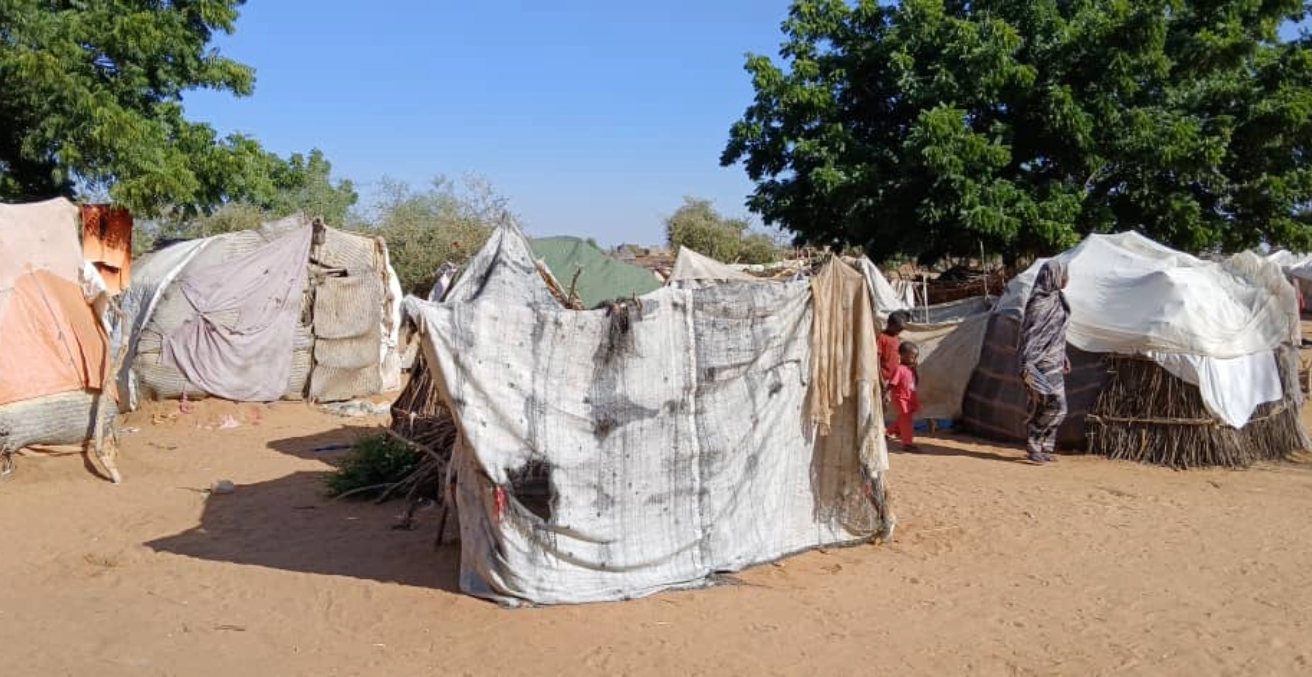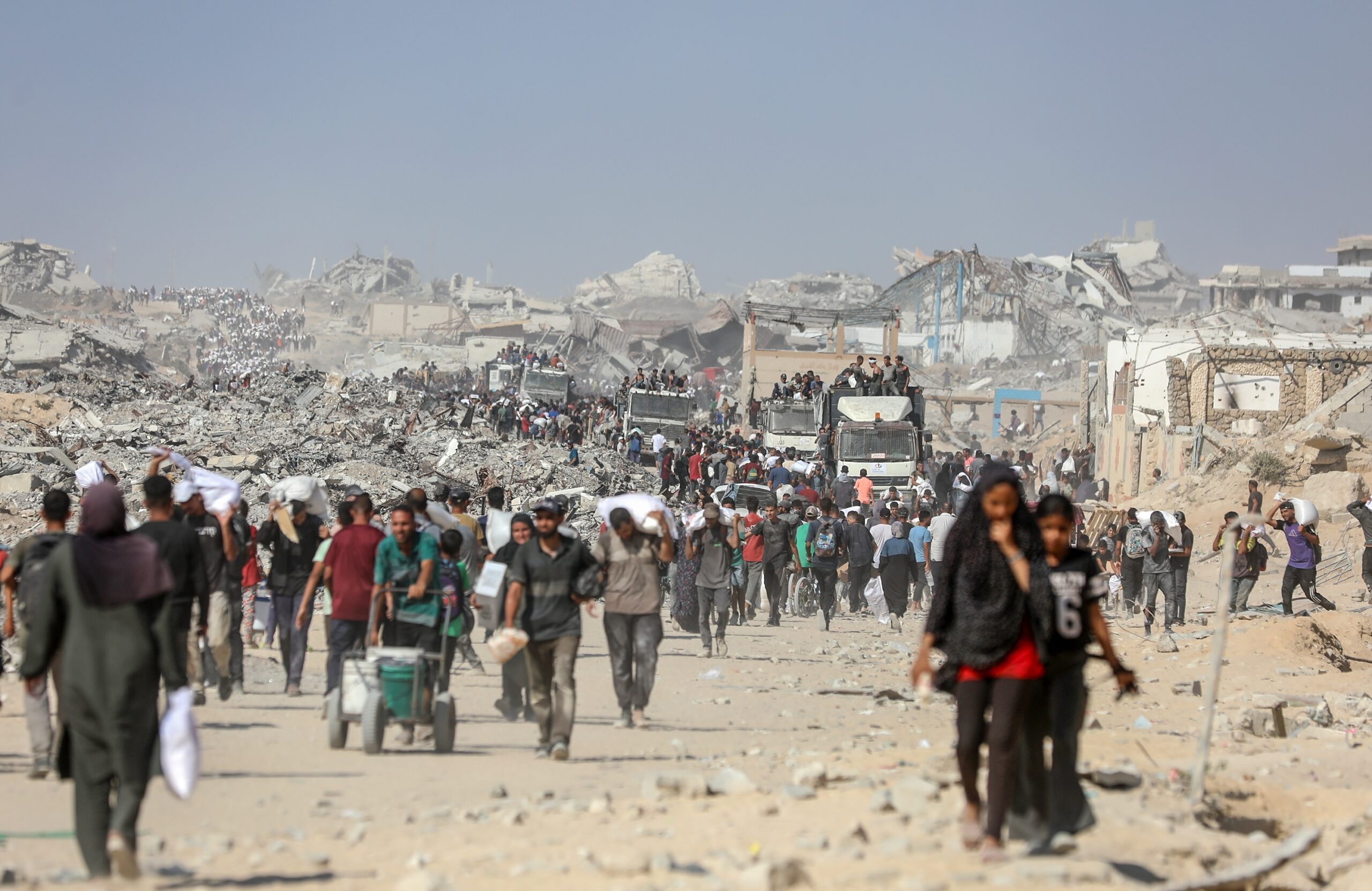In July 2024, armed conflict forced Malak Abdalla and her family to flee their home in the city of Al-Fasher, the capital of North Darfur. She shares her story of enduring hunger, loss, and the uncertainty of war.
Malak, a 45-years-old mother of six, sits in the shade of a tarpaulin in North Darfur’s Zamzam displacement site, 15 kilometers south of Al-Fasher. Since fleeing their home with only the barest essentials, fighting in the Darfur region has intensified, further deteriorating the situation for Malak and the tens of thousands of families who have fled the conflict. Many struggle without reliable shelter in the decades-old displacement site where food is scarce, access to clean water limited, and medical supplies dangerously low.
Many displaced families do not have enough to eat
Fighting and climate hazards have brought about widespread food insecurity in Sudan. Indiscriminate attacks on agricultural sites, the displacement of farming communities, and restrictions on large-scale agricultural support programs as well as humanitarian food distribution continue to add to an already dire situation.
“For months, we only ate fava beans with peanut oil or tamaleta (local vegetables) with salt,” Malak says, describing the food shortages that have plagued her family. “The rainy season made things even worse. Shelter was very limited, and we had nothing to protect us from the relentless rain.”
In response to the growing humanitarian needs at the camp, the people of Zamzam rallied. Community volunteers, including Malak, pooled their resources, creating makeshift kitchens to feed their neighbours and distribute the limited food that was available. But their capacity was quickly overwhelmed by the increasing number of new arrivals to the camp, more people displaced by the ongoing fighting.
The International Committee of the Red Cross (ICRC) and the Sudanese Red Crescent Society (SRCS) stepped in to deliver support, setting up eight community kitchens providing nutritious daily meals featuring lamb, fresh vegetables, and fruit to 10,000 displaced people.
“It has been seven months since we had a decent meal” says Malak. “Eating lamb with rice and sorghum has been a blessing.”
Treatable diseases turned into death sentences
The country’s healthcare system, fragile before the war, hovers on the brink of collapse. Many healthcare workers have fled Sudan and those who remain face immense risks in dangerous conditions. Hospitals have been bombed, looted, or repurposed for military use, leaving millions without medical care. The United Nations estimates that 70-80 percent of health facilities in Sudan are no longer functional while most of the remaining operate at minimal capacity.
At sites like Zamzam, families such as Malik’s struggle to access even the most basic health services. Overcrowded clinics lack essential medicines, equipment, and staff while deadly diseases, including cholera, dengue fever, measles, and malaria continue to rise.
Education a distant dream
“My eldest daughter wanted to become a teacher,” says Malak, “but now she spends her days helping fetch water. We don’t know when our children can return to school.”
Educational institutions destroyed or badly damaged by hostilities have forced millions of children out of school. Many facilities still standing have been repurposed as shelters for the displaced. Children still attending school face overcrowded classrooms with little to no resources. Families struggle to enroll their children, even in safer areas like Port Sudan, far from the main frontlines.
Sexual violence in times of war
The ongoing conflict has led to a significant increase in sexual violence, including reports of rape, forced marriages, abduction for sexual purposes, and sexual slavery involving women, girls, men, and boys in regions such as Khartoum, Darfur, and Kordofan. The ICRC has also documented cases. The true extent of conflict-related sexual violence remains underreported due to stigma, fear of reprisals, and aid agencies’ limited access to affected areas. According to UNWomen, the UN agency focusing on women’s rights and gender equality, Sudan’s warring parties are using sexual violence as a weapon of war.
Humanitarian organisations and the United Nations agencies continue to call for more to be done to address the root causes of sexual violence and to provide support to survivors.
Attacks on aid workers
Aid workers have been killed, and aid convoys, warehouses, and offices looted or destroyed. According to the UN Office for the Coordination of Humanitarian Affairs (OCHA), 25 aid workers, including 13 volunteers from the Sudanese Red Crescent Society, were killed in Sudan between January and November 2024.
Widespread insecurity has made access to many parts of the country extremely challenging for many aid organisations. Even when aid is available, regulatory requirements and security concerns often prevent the assistance from reaching those in desperate need. According to OCHA Sudan, since January 2024, 73 access incidents impacting humanitarian operations in 16 states and 30 localities have been reported. The most frequently reported by aid organisations are operational interference, the influencing of who should receive humanitarian aid (36 percent), violence against humanitarian personnel (27 percent), and regulatory requirements (26 percent). Without urgent action, the humanitarian response will grind to a halt, worsening an already dire crisis.
Breaches of international humanitarian law
The conflict has been characterised by significant breaches of international humanitarian law, with civilians and critical infrastructure deliberately affected. During her visit to Sudan in November 2024, ICRC President Mirjana Spoljaric reiterated the call on all state and non-state armed actors involved in the conflict to respect their obligations under international humanitarian law to prevent further suffering.
“The humanitarian crisis in Sudan is first and foremost stemming from the disrespect of the laws of war. Over eight million people have been displaced due to the fighting. They lack access to the most basic services, and thousands of them have lost contact with their families. The consequences of the conflict could last for decades if no action is taken urgently,” said the ICRC president.
The time to act is now
The international response to Sudan’s unprecedented humanitarian crisis has been painfully inadequate. Humanitarian organisations face funding shortages and the lack of sustained global attention has left millions of Sudanese abandoned.
Lives are hanging in the balance. The longer the world delays action, the worse the crisis will become in Sudan and in neighboring South Sudan and Chad where thousands of Sudanese have fled, placing increased pressure on already limited services.
Governments and international institutions must step up efforts to address the crisis, increase aid funding, and work toward ending the violence. The people of Sudan cannot endure this catastrophe alone. Suffering and instability will only deepen without immediate intervention. The time for decisive action is now.
Germain Mwehu is a Communications Coordinator with the ICRC.
This article is published under a Creative Commons License and may be republished with attribution.





